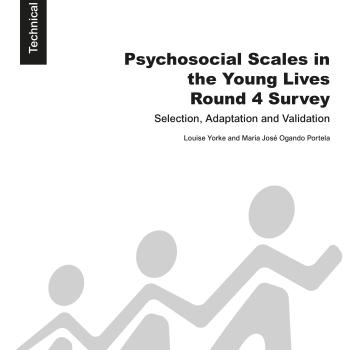Publication Information

The importance of positive psychosocial functioning for children’s current wellbeing and for their future outcomes is recognised across a range of disciplines, yet research on the psychosocial development of individuals in developing countries is in its infancy.
Young Lives has contributed to closing this knowledge gap through extensive data collection on a range of measures of psychosocial skill domains, administered in schools and households in developing countries, where large-scale survey data that include measures of psychosocial constructs are rare.
This technical note describes the procedure involved in the selection, adaptation and administration of the scales administered in the Young Lives Round 4 survey in 2013-14 to capture the development of psychosocial skills of 12-year-old children and young adults age 19 across all four study countries (Ethiopia, India in the states of Andhra Pradesh and Telangana, Peru and Vietnam).
The note can act as a guide for researchers interested in using Young Lives scales with the confidence that they have been tested thoroughly, and for other studies interested in filling the current knowledge gap, whether using the same or a different set of items.

The importance of positive psychosocial functioning for children’s current wellbeing and for their future outcomes is recognised across a range of disciplines, yet research on the psychosocial development of individuals in developing countries is in its infancy.
Young Lives has contributed to closing this knowledge gap through extensive data collection on a range of measures of psychosocial skill domains, administered in schools and households in developing countries, where large-scale survey data that include measures of psychosocial constructs are rare.
This technical note describes the procedure involved in the selection, adaptation and administration of the scales administered in the Young Lives Round 4 survey in 2013-14 to capture the development of psychosocial skills of 12-year-old children and young adults age 19 across all four study countries (Ethiopia, India in the states of Andhra Pradesh and Telangana, Peru and Vietnam).
The note can act as a guide for researchers interested in using Young Lives scales with the confidence that they have been tested thoroughly, and for other studies interested in filling the current knowledge gap, whether using the same or a different set of items.

